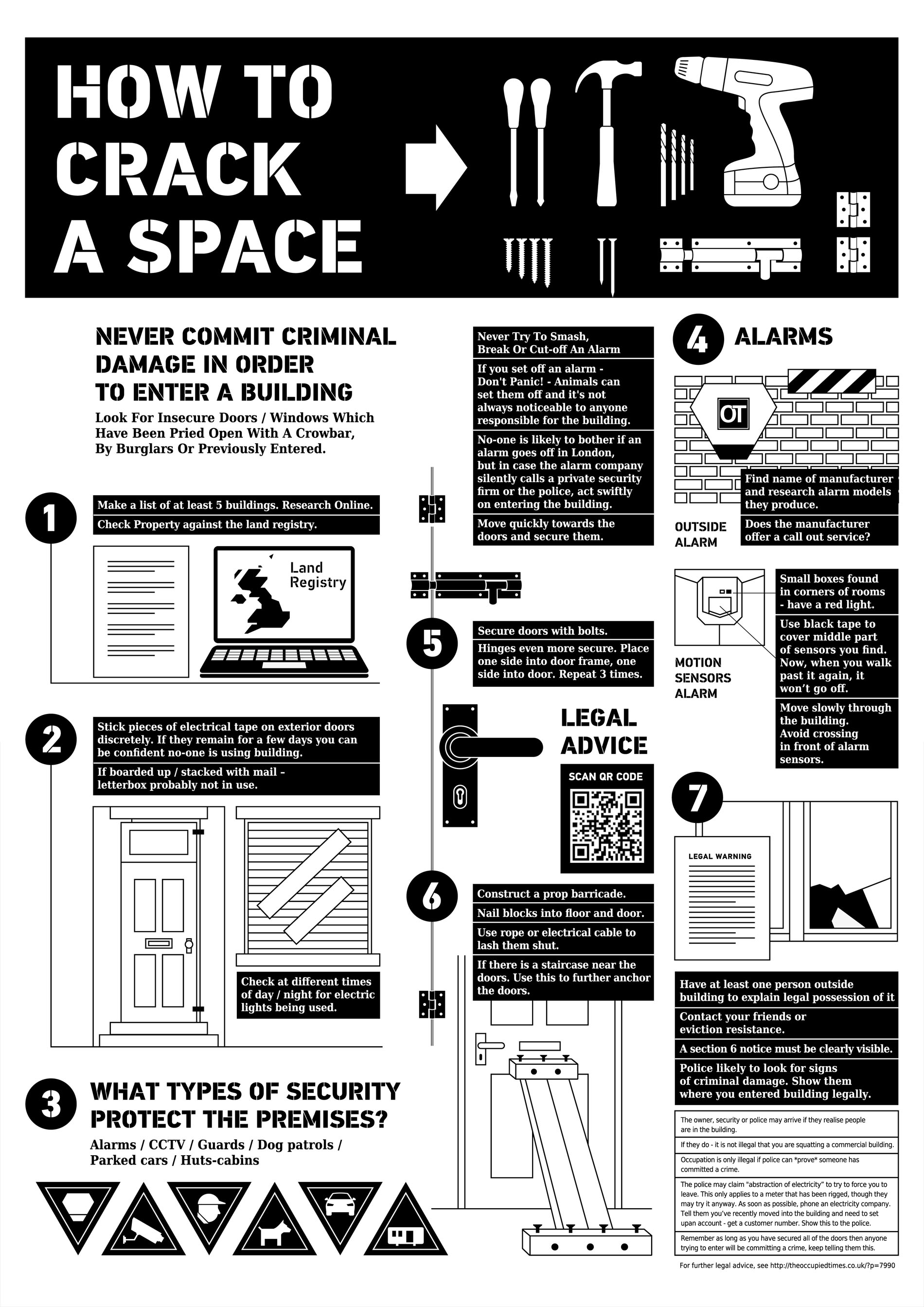Click Image for High-Resolution PDF | Download JPEG
Legal Details
Squatting and the Law
Since 1st September 2012 it is a criminal offence to squat in residential property. As the law puts it, the offence is to trespass in a residential property with the intention of living there. If you are squatting or think you might be accused of it, you need to prepare your arguments why you are not committing this offence. For example;
• You are not trespassing (you have a tenancy or licence)
• The property is not residential (was not designed or adapted for residential use before you moved in)
• You are not living there or intending to live there (you are minding the place for others, you and others are running a non-residential social centre….)
• If you are in property that includes residential areas you should not be living in those parts.
Other criminal offences that relate directly to trespass are
• Not moving out within 24 hours of an Interim Possession Order being made by a court and served on the property
• Aggravated trespass – occupying land including any buildings with the intention of stopping (obstructing, disrupting or intimidating people carrying out) normal, lawful work that is going on.
Otherwise occupiers are still protected by Section 6 Criminal Law Act 1977 which makes it a crime to force entry to a property which is occupied and whose occupiers object to the threatened entry. Have a copy of an up-to-date Legal Warning from the Advisory Service for Squatters (ASS) handy or on display – available here.
Other crimes
The police can of course use their powers of entry and arrest against squatters as against other people if they have reasonable suspicion that a crime is being, has been, or is about to be committed. This does NOT mean they have a right to evict a property and if they use arrests or threats of arrest solely in order to remove people from their home this should be challenged. Make detailed notes of who did what and contact a reliable solicitor or ASS as soon as possible.
Alleged crimes which police often use to try to evict people include:
• Abstraction (theft) of electricity – set up a contract with the relevant supplier as soon as possible so they can’t claim you had the intention of using electricity with the intention of not paying
• Criminal damage – the cops might try to claim that you have caused damage to the building or its fittings when you entered it. Obviously, having entered through an open door or window, any damage to the building was not caused by you.
• Burglary – entering as a trespasser with intent to cause criminal damage or theft
Be prepared to argue with the cops if they are trying to force entry to the building on suspicion of these crimes, but a well barricaded property is often the best defence.
Eviction
Normally the owners of the property will go to court to get a possession order to get you out. They might try to get an Interim Possession Order (IPO) first, in which case the occupiers will be committing a criminal offence if the order is made and they don’t move out within 24 hours of it being served. If their application order for an IPO fails they may try to get another one, or they may just wait for the regular possession hearing which should be mentioned in the papers you get with the IPO.
If the occupation is high-profile and/or for political reasons they may try to get an injunction first.
The full Possession Order can only be enforced by court bailiffs (although they are normally private bailiff companies empowered by the court) who will normally take some time (depending on the area) and will normally tell you when they are coming (though there is only guidance rather than law to say they should).
Court claims should always be challenged – ASS and others have decades of experience at checking through the papers for errors.
Resisting bailiffs
Both County Court bailiffs and High Court enforcement officers have the legal right to use tools and reasonable force to evict you; a warrant or writ of possession gives bailiffs the authority to gain entry and remove occupants.
Section 10 of the Criminal Law Act 1977 makes it a criminal offence for anyone to “obstruct an officer of the court” enforcing a possession order obtained against trespassers. This is more likely to apply to people standing outside of the building and physically obstructing a bailiff rather than people inside the well barricaded building, as it would be quite hard to prove who had done the barricading. Squatters can ask that anyone claiming to be a bailiff or sheriff produces his/her identification and warrant (or writ) for possession. If these are not produced any resistance or obstruction might not be an offence as it is a defence if you didn’t know the person being obstructed was a bailiff/sheriff.
Arrest
If arrested always say ‘No Comment’ in police interview – do not accept the duty solicitor and call a recommended solicitor from the police station or after you’ve been bailed/released. For more information on arrest see the Legal Defence and Monitoring Group’s “No Comment” – available here.
For more information see Squatting Made LESS Simple
Section 6 Notices
Further Advice
The following groups offer a variety of advice and support to squatters. Every squat is part of a national and international community. For news from the world of squatting see:
Advisory Service for Squatters – General legal and practical advice.
The Squatters Legal Network – Questions about new law (s144 LASPO), threats of eviction/arrest and other emergencies – EMAIL
Eviction Resistance – For help resisting any evictions.
[Squat!net] – International squat news and information.
Downloadable Formats

This work is licensed under a Creative Commons Attribution-NonCommercial-ShareAlike 3.0 Unported License.
